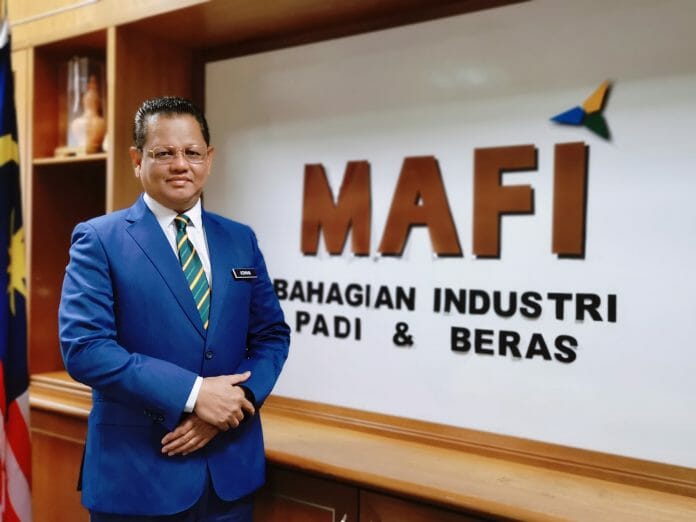Director-General for the Ministry of Agriculture and Food Industry (MAFI), Azman Mahmood, in a special meet the media session, led the pre-launch briefing of Project Smart Sawah Berskala Besar (Smart SBB) a day before the official launch by his Minister.
During the pre-launch brief, Azman gave an overview and topline description of how Smart SBB will be implemented, as well as an introduction to Smart SBB Phase 2.
He listed the key factors that contribute to the need for Smart SBB’s implementation, including the nation’s low output of rice, farmers who are aging, low harvesting rate, limited paddy seed variety, lack of youth interest in the industry, and the lack of proper supporting infrastructure.
In 2020 when the Smart SBB was introduced, the concept was of a fusion that included two parties; farmers and industry players. This was designed to advertently remove the middleman, as the traditional method was causing much of the profits to go to these agents leaving paddy farmers fuming with little to nothing.
This was identified as one of the aspects refraining farmers from expanding their fields or showing disinterest in the sector causing severe impact on rice production and this in turn, forces the government to increase imports every year. Smart SBB seeks to address the issue of rice monopoly by middlemen and get large corporations directly to be involved with the growers.
Under this program, both farmers and corporations will be monitoring the process from start to end with both parties having vested interest. The corporation will ensure the soil are tested and monitored constantly, together with the farmer the right seed is selected, careful use of fertilisers and pesticides will be administered including the marketing aspect of the rice from each state and farm.
“The concept of Smart SBB is to control the process from farming to harvest until the rice is produced and packaged. We’re targeting 10 years before we reach 85% of rice output for the country.
“Through this concept, we have identified 17,000 hectares nationwide, the role of the large corporation is a partner with the farmers, make the investment in order for the field to produce higher yields.”
“Now farmers need to come up with around RM1,681 per hectare while the government subsidises RM2,500. When Smart SBB comes into the picture, the private company will come up with RM 3,200, covering the total cost of managing the field”
“With this, the target is to increase yield to 7 metric tons from 3.9 or 3.5 at the moment, which means if we reach the target it will be possible to achieve 80% of our nation’s needs through the commitment from all parties, farmers, corporates and the agencies.
Azman cited how currently some of these paddy fields can only produce yields 2 -3 metric tons, whereby well-managed fields like the ones owned by Nestle in Kedah are producing 10-14 metric tons per year.
In order to have farmers see the difference in marketability, the Smart SBB will introduce two schemes, one that involves the cultivation of ordinary white paddy and another scheme that involves local fragrant paddy.
Those who choose to produce the fragrant paddy variety will be getting more income compared to the regular variety since its priced at RM1,200 and RM360 subsidy while the fragrant paddy is priced at RM 1,540 and RM360 subsidy which works out to RM1,900 in total.
Meaning farmers can add to their income by 47%, this is the aim of the Ministry to uplift these communities from their current situation. Additionally, the potential higher earnings working in paddy fields will also attract youths into the sector.
BusinessToday covered the MoU Signing Ceremony for the Smart SBB Program. To read the full article, click here.









